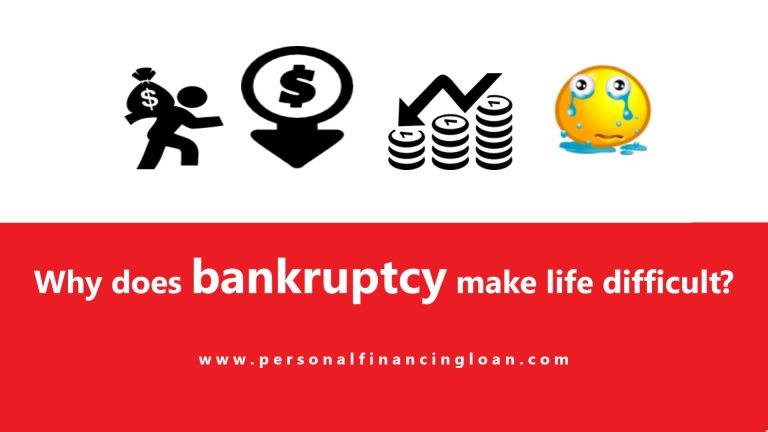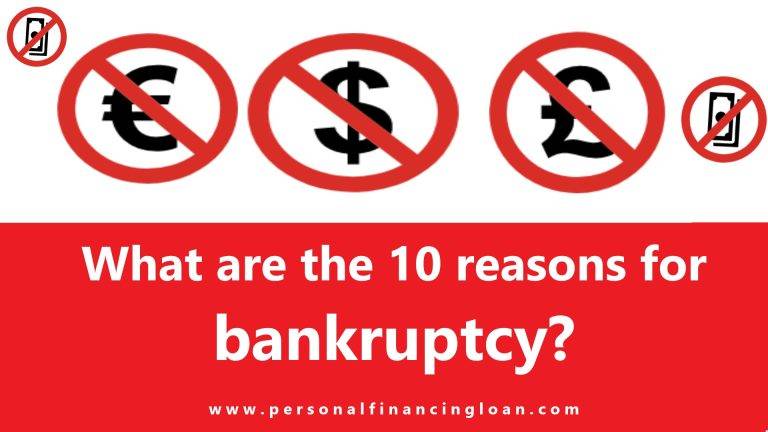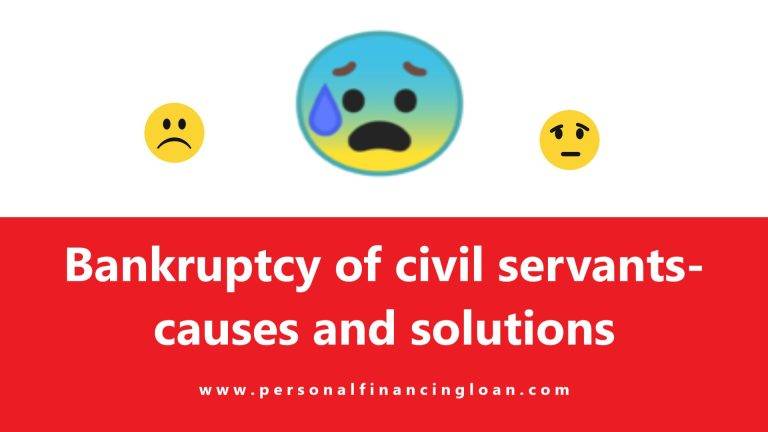Debt Management Discover the path to financial peace through effective debt management strategies. Stay on top of payments, manage bills, and budget for the future...
Bankruptcy
Explore why bankruptcy poses life challenges. Discover insights on overcoming difficulties and rebuilding financial resilience.
Life Difficult
Bankruptcy can make life difficult because it affects one’s creditworthiness and financial standing, making it difficult to obtain loans or mortgages and making it difficult to rent an apartment or buy a home. In addition, bankruptcy can result in the loss of property, as well as the loss of certain types of employment and professional licenses. Finally, the stigma associated with bankruptcy can make it difficult for individuals to recover and move forward with their lives.
Bankruptcy makes life difficult in many ways, both financially and emotionally. First and foremost, bankruptcy can have a major negative impact on one’s credit score, which can make it difficult to access credit and loans in the future. This can be especially problematic when trying to purchase major items, such as a car or home, as many banks and other lenders may not be willing to offer favorable rates, if they are willing to offer them at all.
Financial Burden
The financial burden of bankruptcy can be very difficult to manage. During a proceeding, individuals often have to make difficult choices about which debts to pay and may have to drastically cut their spending. Even after a bankruptcy is discharged, individuals may still struggle to meet their financial obligations, particularly in the first few years following bankruptcy.
In addition to financial hardship, the emotional toll that filing for bankruptcy can take can be significant. Filing for bankruptcy is typically a very difficult decision for individuals to make and can be accompanied by feelings of guilt, embarrassment, and shame. Individuals may also face personal and professional ridicule from families, friends, and colleagues as a result of filing for bankruptcy. Moreover, the recovery process can be a long and arduous one and often takes years to complete.
The Reasons Behind Bankruptcy
Understanding Financial Distress
Bankruptcy is a legal process undertaken when individuals or businesses can no longer meet their debts and financial obligations. It provides an opportunity to manage debt and regain stability, but it often stems from various financial challenges. Recognizing the causes of bankruptcy can help prevent financial failure and encourage responsible financial management.
1. Failed Business Operations
Economic and Market Challenges
One of the most common causes of bankruptcy is a business failing to generate sufficient income to cover expenses. This often results from economic downturns, poor management, or unfavorable market conditions, leading to an inability to pay creditors.
2. Excessive Debt
Overburdened Finances
Individuals and businesses overloaded with debt may struggle to meet their financial obligations, leading to frozen accounts, wage garnishments, foreclosures, and repossessions. High credit card debt is particularly problematic, creating overwhelming payment responsibilities.
3. Loss of Income or Major Customers
Revenue Decline and Business Risk
A sudden drop in sales or loss of a major client can push businesses into financial hardship. Increased competition and declining consumer demand may prevent businesses from remaining profitable, forcing them toward bankruptcy.
4. Devaluation of Assets
Market Volatility
When property, stocks, or investments decrease in value, individuals and businesses may struggle to meet financial obligations. Market instability can make assets worthless or significantly less valuable, leading to bankruptcy.
5. High Medical Expenses
Unexpected Healthcare Costs
Medical bills can burden individuals and businesses, leading to financial strain. Unaffordable healthcare costs force people to reduce spending in other areas and, when unpaid, creditors may take legal action.
6. Personal Guarantees on Business Debt
Individual Responsibility for Business Liabilities
When individuals guarantee business loans, they become personally responsible for payments if the company fails to meet obligations. This often results in personal bankruptcy when businesses collapse.
7. Liability Judgments
Legal Consequences
If individuals or businesses face lawsuits and receive court-ordered payments, they may struggle to cover costs. When unable to fulfill financial obligations, creditors can place liens on property and income, leading to bankruptcy.
8. Fraud and Embezzlement
Financial Mismanagement
Misappropriation of funds, fraudulent activity, or embezzlement within businesses can cause revenue loss, making it difficult to sustain operations and meet payment deadlines.
9. Tax Evasion or Non-Payment
Government Intervention
Failing to pay taxes on time can lead to government legal action. If tax liabilities accumulate beyond an individual’s or business’s ability to pay, bankruptcy often becomes the only solution.
10. Poor Cash Flow Management
Unstable Financial Planning
When businesses spend more money than they earn, poor cash flow management depletes resources and prevents financial sustainability. Without proper control over financial operations, bankruptcy is inevitable.
Bankruptcy is often a result of multiple financial hardships. By recognizing these causes early, individuals and businesses can take preventative steps to maintain financial health.
Steps to Avoid Bankruptcy for Civil Servants
1. Set Aside a Budget for Savings and Emergency Funds
Prioritizing Financial Security
Establishing a dedicated savings plan helps deter financial hardship. Civil servants should allocate funds for both long-term savings and emergency expenses, ensuring they have resources available for unexpected situations.
2. Avoid Excessive Credit Card Debt
Responsible Credit Usage
Credit cards offer convenience but can quickly lead to debt accumulation. Civil servants should limit credit card use to emergencies and avoid overspending, ensuring balances remain manageable and interest charges stay low.
3. Understand Your Expenses
Tracking Financial Activity
Maintaining a clear overview of income and expenses is essential for making responsible financial choices. Analyzing spending habits helps civil servants identify areas for savings and prevents unnecessary financial strain.
4. Explore Debt Consolidation Options
Managing Financial Obligations
For those struggling with debt, consolidation options can ease financial burdens by reducing monthly payments and interest rates. Exploring loan restructuring or refinancing can help civil servants stay in control of their financial health.
5. Create and Stick to a Budget
Financial Discipline for Stability
Developing and adhering to a budget promotes responsible spending. Civil servants should routinely review their financial plans, adjust expenses, and ensure income is allocated efficiently to necessary costs and savings.
6. Avoid Using Income to Cover Debt
Smart Debt Management Strategies
Debt payments should come from discretionary funds rather than primary income. Ensuring salary is reserved for essential expenses prevents excessive financial strain and minimizes the risk of accumulating unmanageable debt.
7. Live Within Your Means
Smart Financial Habits
Avoiding bankruptcy starts with practical financial decisions. Civil servants should focus on budgeting wisely, setting financial goals, and resisting impulse purchases to maintain financial stability.
8. Properly Manage Credit Cards
Preventing Overspending
Using credit responsibly means paying balances in full each month and avoiding unnecessary purchases. Civil servants should treat credit cards as a financial tool rather than a means for excessive spending.
9. Resist Lifestyle Inflation
Prioritizing Financial Growth
Increasing income does not mean increasing expenses. Civil servants should save additional earnings rather than spending more, allowing them to reduce liabilities and build long-term financial security.
10. Maximize Federal Retirement Funds
Planning for the Future
Contributing the maximum amount to government retirement plans ensures a secure future. Utilizing the Thrift Savings Plan and other retirement accounts allows civil servants to reinvest for financial stability.
11. Prioritize Emergency Planning
Preparing for Unforeseen Expenses
Unexpected financial burdens can arise at any time. Civil servants should maintain an emergency fund, ensuring they can cover costs like medical expenses or urgent repairs without falling into debt.
By following these strategies, civil servants can safeguard their financial future while avoiding bankruptcy. Prioritizing responsible spending, structured savings, and disciplined budgeting ensures long-term financial security and stability.
Frequently Asked Questions (FAQ)
Find answers to common questions in our FAQ section. Whether you need help, guidance, or quick tips, we’ve got the information you need! Browse our expert responses and get the solutions you’re looking for—fast and easy.
Bankruptcy: Summary
- Article Title: Bankruptcy
- Category: #FinancialManagement
- Purpose: #GeneralInformation
Financial Management
Need help with financial management? We offer a range of solutions to help you manage your finances smarter. Get tips, strategies, and services tailored to achieve financial stability. Click below to learn more and start your financial journey today!
Boost Your Savings: Best Practices & Benefits
Saving Learn practical strategies for saving money and securing your financial future. Discover sustainable habits that help you grow wealth while making smart, eco-conscious choices....
Bankruptcy Challenges: Strategies for Best Financial Rebirth!
Bankruptcy Explore why bankruptcy poses life challenges. Discover insights on overcoming difficulties and rebuilding financial resilience. Life Difficult Bankruptcy can make life difficult because it...
Easy Side Income: Multiply Your Earnings Today!
Side Income Discover simple yet effective strategies to unlock additional income streams effortlessly. Explore practical tips and easy-to-implement methods to boost your earnings and attain...
Web Directories
Find the best resources tailored to your interests! Whether you’re searching for travel ideas, money-saving tips, fun hobbies, or trusted product reviews, we’ve got you covered. Our carefully curated recommendations help you discover new experiences and make informed decisions—effortlessly. Start exploring today!
- https://asiaworldtour.com: “Asia World Tour: Your Gateway to Asian and World Adventures”
- https://personalfinancingloan.com: “Personal Financing Loan: Your Path to Financial Freedom”
- https://hobbyforte.com: “HobbyForte: Discover Your Car Passion, Explore Your Interests”
- https://reviewsanything.com: “ReviewsAnything: Your Trusted Source for Honest Gadget Reviews”
- https://rumahmampumilik.com: “Rumah Mampu Milik: Your Affordable Homeownership Journey Begins Here”
- https://malaysiadigit.com: “MalaysiaDigit: Your Digital Destination for News and Insights”
- https://vipmalaysia.com: “VIP Malaysia: Elevate Your Experience in Malaysia”
- https://nordiyana.com: “Indulge in Elegance at Nordiyana: Latest Recipe and Culinary Inspirations”
- https://e-penyatagaji.com: “E-Penyata Gaji: Simplifying Payroll Management for You”
- https://googleasia.org: “Google Asia: Explore the World and Asia’s Wonders with Google Asia”
- https://malaysiafit.com: “Malaysia Fit: Your Partner in Health and Wellness”
- https://koperasi.info: “Koperasi: Building Communities, Empowering Lives”
- https://recipeinside.com: “RecipeInside: Unveiling Culinary Creations, Your Guide to Delicious Dishes”
- https://asiahealthcenter.com: “Asia Health Center: Your Source for Holistic Wellness Solutions”
- https://nationalhealthcenters.com: “National Health Centers: Your Source for Vital Health Information and Community Care”
- https://malaysiabit.com: “MalaysiaBit: Stay Informed, Stay Connected”
- https://epenyatagaji.com: “E-Penyata Gaji: Your Digital Payslip Solution”
- https://koperasi.work: “Koperasi Work: Collaborate, Innovate, Succeed”
- https://koperasi.business: “Koperasi Business: Driving Entrepreneurship, Fostering Growth”
Web Directories
Welcome to our comprehensive web directories! Explore a world of information and resources tailored to your interests and needs. From travel adventures to financial solutions, hobbies, reviews, and more, our curated collection of links offers something for everyone. Click on the above links to start your journey towards discovering new experiences and expanding your horizons. Your next destination awaits!
- https://asiaworldtour.com: “Asia World Tour: Your Gateway to Asian and World Adventures”
- https://personalfinancingloan.com: “Personal Financing Loan: Your Path to Financial Freedom”
- https://hobbyforte.com: “HobbyForte: Discover Your Car Passion, Explore Your Interests”
- https://reviewsanything.com: “ReviewsAnything: Your Trusted Source for Honest Gadget Reviews”
- https://rumahmampumilik.com: “Rumah Mampu Milik: Your Affordable Homeownership Journey Begins Here”
- https://malaysiadigit.com: “MalaysiaDigit: Your Digital Destination for News and Insights”
- https://vipmalaysia.com: “VIP Malaysia: Elevate Your Experience in Malaysia”
- https://nordiyana.com: “Indulge in Elegance at Nordiyana: Latest Recipe and Culinary Inspirations”
- https://e-penyatagaji.com: “E-Penyata Gaji: Simplifying Payroll Management for You”
- https://googleasia.org: “Google Asia: Explore the World and Asia’s Wonders with Google Asia”
- https://malaysiafit.com: “Malaysia Fit: Your Partner in Health and Wellness”
- https://koperasi.info: “Koperasi: Building Communities, Empowering Lives”
- https://recipeinside.com: “RecipeInside: Unveiling Culinary Creations, Your Guide to Delicious Dishes”
- https://asiahealthcenter.com: “Asia Health Center: Your Source for Holistic Wellness Solutions”
- https://nationalhealthcenters.com: “National Health Centers: Your Source for Vital Health Information and Community Care”
- https://malaysiabit.com: “MalaysiaBit: Stay Informed, Stay Connected”
- https://epenyatagaji.com: “E-Penyata Gaji: Your Digital Payslip Solution”
- https://koperasi.work: “Koperasi Work: Collaborate, Innovate, Succeed”
- https://koperasi.business: “Koperasi Business: Driving Entrepreneurship, Fostering Growth


